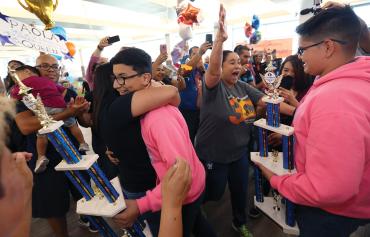Saul Ramirez, a middle school art teacher and chess coach, challenged the audience to consider the following as he opened his 2018 keynote address for the annual conference of the National Association for Bilingual Educators:
Think about chess for a minute. Imagine you walk into a chess club at a school. Who do you expect to see there? Be honest. White kids? Asian kids? At-risk Latino kids? Well, I have a question for you. For all of us actually. Why not at-risk Latino kids?
Ramirez himself had been an English language learner (ELL) and a former chess champion; he knew how chess could change students’ lives. His own experiences inspired him to start the Henderson Middle School chess team. In 2015, his team of 12 ELLs from El Paso, Texas, most of whom had never previously heard of chess, went on to become national chess champions.
Henderson is a low-income school located in one of the poorest zip codes in the United States, right on the border with Mexico. If you stand on the roof of the school, you can see across the Rio Grande to Juárez, Mexico. About half of the kids who attend Henderson are English language learners. Many of them are from Juárez and have witnessed the violence that is an unfortunate part of life there. In the years when these students attended elementary school, two of every 10 drug-related murders in Mexico occurred in Juárez.1
I first heard about Ramirez’s story in the spring of 2015 while I was at Henderson conducting staff development for teachers of ELLs. It was one of those days where nothing seemed to be going right; some of the teachers were having trouble finding substitutes, and the sound system wasn’t working. I decided to try something different to get us into a positive mindset. I asked the teachers to share some success stories that they had witnessed while teaching. I expected to hear stories about kids rapidly gaining English proficiency, maybe some improvement in test scores, but what I heard far exceeded my expectations.
One of the teachers shared the story of the Henderson chess champions. He described how in the fall of 2014, only 12 students signed up for Ramirez’s fledgling team: 11 sixth-grade boys and one seventh-grade girl, most of whom were ELLs. He taught them the rules and began taking them to tournaments.
Gradually, the students began winning local competitions and beating teams from other schools. In the spring of 2015, Ramirez believed they were ready for the state championship tournament, which was being held in McAllen, Texas. With hopeful hearts, he and the team piled into a van and drove all the way to McAllen from El Paso. The 790-mile journey took the team two days to complete.
Walking in, the students could tell that they were different from the other teams. The Henderson team didn’t have uniforms; the students didn’t even have a practice room because they couldn’t afford to rent one; they sat in the hallway to play practice games. They were an all-Hispanic team, with only 12 very inexperienced players. But they had worked hard, and Ramirez believed in them. Despite feeling intimidated, they won first place in their beginners division for the state of Texas. The Henderson Middle School Hornets were now state champions! They were given a hero’s welcome when, trophies in hand, they returned to El Paso.
Ramirez had promised his team that if they won at state, he would take them to the national championship tournament in Louisville, Kentucky. Off they went—and won first place.
Hearing this story, I was stunned. How had I not heard about this great win? How was this news to me? I couldn’t stop thinking about it, and immediately felt compelled to share this story. Here was a sport that low-income Latino kids were not typically known for playing and yet they won first place. Considering the climate of (often) negative energy and deficit thinking related to Latino youth, this story was beyond inspiring. It debunked the common perceptions and stereotypes of low-income ELLs and Mexican American youth. It forced me to reflect on my own attitude and thoughts regarding ELLs.
A Renewed Focus on ELL Potential
For 15 years, I had been encouraging teachers through my writing and workshops to focus on what English language learners are capable of and the linguistic and cultural assets they bring to our communities. Despite what I had been teaching, when I heard this story I was still surprised. The profound effect of hearing it made me realize the extent to which I still needed to alter my perceptions and expectations regarding ELLs. I wanted everyone to hear this story—teachers, students, parents, administrators. On the plane home that night, I knew I had a mission: sharing this story.
In the 27-plus hours of interviews I conducted with Ramirez and his team for my book The Champions’ Game, I began discovering what this teacher does to make such a difference in the lives of his students.
He has a way of discovering their strengths and making them shine. He told me: “I strive to be radically available to my students. I try to be fully present with all my strengths to help build up theirs. I bring who I am and, in a spirit of love, put all my talents, my stories, and every resource I have into serving them. I make a commitment every day to be as present to the students as I possibly can.”
From the first time he meets his students, Ramirez works to connect with them on a personal level: “Even the hardest kid to reach has a story to tell that we can connect to.” But to make that connection, Ramirez must listen. He has to listen not just with his ears, but with his heart. He has to look past labels and negative experiences.
One of his students, Edmundo Gomez, started with the chess team in sixth grade. (To protect his privacy, I have changed his name.) As Ramirez got to know Edmundo, he slowly learned his story. Edmundo’s mom worked as a cleaner in a spa, as well as working a full shift at a restaurant. His dad lived in Juárez, and Edmundo would often cross the border to work with him. Edmundo had been in the United States most of his life, was taking remedial classes, and was also in trouble at school, but Ramirez had faith in him. Not just in his ability to play chess but also in his ability to acquire English and succeed in school.
After winning the national championship, Ramirez told the team members that they would need to maintain A or B averages throughout the next year to continue competing. Edmundo had never been an A or B student, but he loved the chess team. He told Ramirez he didn’t think he could meet the challenge. Ramirez responded with nothing but positive energy. He described to Edmundo what he saw in him. Ramirez told Edmundo that he knew he worked hard outside of school, was kind to his family, and had the intelligence and heart of a champion. Ramirez promised to help him. He put all the resources he had at Edmundo’s fingertips, including tutoring, afterschool support, and reading materials.
That following spring, because of a series of poor decisions, Edmundo got arrested and put on probation. His probation officer talked to Ramirez, telling him that Edmundo would not be allowed to attend the state tournament in a few weeks. Ramirez requested that Edmundo be given special permission to go, saying that he would take personal responsibility for him—that he had faith in him. When the tournament came around, Edmundo was allowed to go, placed 16th in the state, and contributed to Henderson’s victory.
Today, Edmundo is a 10th-grader. He is no longer in remedial classes, and he is no longer classified as an English language learner. Edmundo was able to raise his own expectations because Ramirez helped him change the way he saw himself. If you were to talk to Edmundo, he would tell you: “Mr. Ramirez did not see me as a troublemaker. He saw me as a champion.”
Ramirez’s hard work has elevated teacher expectations of what is possible—whether their students are classified as ELL, gifted/talented, low income, or having special needs. Ongoing research confirms the tangible effects of teacher perceptions and expectations on student achievement,2 either positive or negative. Following the first state chess victory, teachers’ expectations began to shift at Henderson. Elizabeth Maldonado, the school’s principal, reported: “There has been a positive change in the way our teachers see students’ abilities. Their mindsets have shifted, and they now see that students from this area are able to accomplish great things academically.”
The effect of the shift in teacher expectations is reflected in Henderson student responses to a recent El Paso Independent School District school climate survey. The results show increases in the percentage of students who stated that they “feel [their] teachers believe in [them]” and that they “can participate in after-school activities.” There was also a substantial decrease in the percentage of students who stated that they “have been bullied at school.”3So it is not just teacher expectations that are changing at Henderson, but also those of the students.
One example of changing student expectations is the increase in the number of girls on the chess team since the 2015 state and national wins. As educators, we are focusing more and more on ways to increase female participation in the fields of science, technology, engineering, and math.4Specifically, we are looking for ways to improve Latinas’ beliefs about what they can accomplish in the context of the American school system.5
In the 2014–2015 school year, Ramirez had only one girl on the team; Lirio Gomez. When she placed 24th in the nation in her division, many of the girls at Henderson began to look at chess differently. Chess is a sport in which girls (especially Latinas) have been historically underrepresented. This past year, there were 12 girls on the Henderson chess team, making up 50 percent of the team and contributing to the team placing first at nationals in two divisions, proud examples of intelligent, successful Latinas for girls across the United States. The example of the Henderson Middle School chess team encourages all of us, as educators, to avoid allowing past expectations to determine future outcomes.
This story has changed how I work with educators. I still emphasize the importance of increasing opportunities for English language acquisition and content mastery for ELLs; I always will. But I now increasingly emphasize the importance of helping English language learners (particularly those from low-income backgrounds) reach their full potential beyond academics.
I find myself asking: How can we listen better to students’ stories? What do we need to do to see past labels and expectations to identify their strengths? How can we make ourselves truly present and available? How can we support our students with our own strengths and resources? And most of all, have we done everything we can to show our students that they have what it takes to be champions?
John Seidlitz is an author and educator who provides professional development for teachers of English language learners.
Endnotes
1. See Sergio González Rodríguez, Huesos en el desierto (Barcelona: Anagrama, 2002).
2. Faiza M. Jamil, Ross A. Larsen, and Bridget K. Hamre, “Exploring Longitudinal Changes in Teacher Expectancy Effects on Children’s Mathematics Achievement,” Journal for Research in Mathematics Education 49 (2018): 57–90.
3. E. Natalia Strobach Oronoz, 17–18 School Climate Survey: Henderson Middle School (El Paso, TX: El Paso Independent School District, 2018).
4. For information on programs that have successfully increased Latina involvement in STEM (science, technology, engineering, and math) fields, see Robert W. Fairlie and Rebecca A. London, “Getting Connected: The Expanding Use of Technology among Latina Girls,” in Latina Girls: Voices of Adolescent Strength in the U.S., ed. Jill Denner and Bianca Guzman (New York: NYU Press, 2006), 168–184.
5. Christia Spears Brown and Campbell Leaper, “Latina and European American Girls’ Experiences with Academic Sexism and Their Self-Concepts in Mathematics and Science during Adolescence,” Sex Roles 63 (2010): 860–870.




